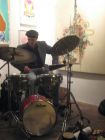Improv Notes: October 2011
 IMprov Notes: News of the Moment October 2011 Thinking Spaces: The Guelph ICASP Reading Group and Speaker Series
 Thinking Spaces: The Improvisation Reading Group and Speaker series runs a reading group session during the academic year every two weeks (currently Fridays 4-6pm). Throughout the year, this group also organizes public talks and workshops. Each reading group focuses on a particular reading circulated in advance, and may also include short informal presentations by current ICASP students, artists or community groups. Readings include articles and chapters, music and performances or other types of “reading”. This group is coordinated by the current ICASP postdoctoral research fellow at the University of Guelph. The group meets at a central location, currently the Guelph Public Library. The group also organizes social occasions following the reading group sessions and speaker events.
Join us at any time throughout the year. Community, faculty, students… all welcome! Please join us for Thinking Spaces: The Improvisation Reading Group and Speaker Series on Friday, October 14 from 4-6pm in the 2nd floor board room at the Main Branch of the Guelph Public Library (100 Norfolk Street). The topic of discussion will be “Improvising Capitalism: Shopping and Consumer Choice.” Shopping can be seen as one of the most pervasive improvisatory acts, especially in North America. Faced with a panoply of stores and products, shoppers browse, consider, and maybe do some research. They try on this, have a taste of that, and ultimately make a choice. Moreover, their choices have real impact: they can help transform Starbucks and Cabbage Patch Kids into international commercial forces, while driving Sony Betamax and Eaton’s department stores into ignominy or bankruptcy. In this way, shopping might be read as empowering – a way for everyday people to demonstrate their independence, exercise their freedom of choice, and “vote with their dollars.” In a sense, shopping is akin to improvising on capitalism. But what are the limits to this kind of improvisation? To what extent are shoppers’ choices made for them, a priori? Can consumers negotiate all of the external forces that push their dollars in one way or another and still retain a kernel of improvisatory agency? What about the gendered character of shopping? And what are the political dimensions and implications of the ideas of “freedom of choice,” and “voting with one’s dollars”?
The discussion will grow out of the 1959 “Kitchen Debate” between Richard Nixon and Nikita Kruschev Upcoming Reading Group Dates: Friday, October 28, 2011 Friday, November 4, 2011 Friday, November 18, 2011 Friday, December 2, 2011  Check out yet another positive review, by ICASP postdoctural fellow Sara Villa, of the 2011 Guelph Jazz Festival at All About Jazz.
Quote of the Month:
Improvisation implies a deep connection between the personal and the communal, self and world. A “good” improviser successfully navigates musical and institutional boundaries and the desire for self-expression, pleasing not only herself but the listener as well.
– Rob Wallace
Improv Notes was initially distributed in 2008 as a quarterly newsletter. The ICASP team is happy to announce that the newsletter is back in action and will be distributed once a month. If you have anything improvisation related that you would like to have included in the newsletter, please send an email to: icaspweb@uoguelph.ca About ICASP
The international Improvisation, Community, and Social Practice research project explores musical improvisation as a model for social change. The project plays a leading role in defining a new field of interdisciplinary research to shape political, cultural, and ethical dialogue and action. As a form of musical practice, improvisation embodies real-time creative decision-making, risk-taking, and collaboration. Improvisation must be considered not simply as a musical form, but as a complex social phenomenon that mediates transcultural inter-artistic exchanges that produce new conceptions of identity, community, history, and the body. This project focuses primarily on jazz and creative improvised music. The dominant theoretical issues emerging from this music have vital social implications. Check out our diverse research collection. Want to read past newsetters, or refer a friend to the monthly newsletter, then please do!
|
|


